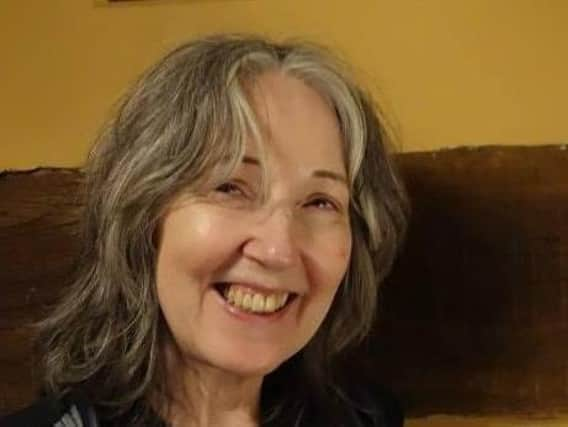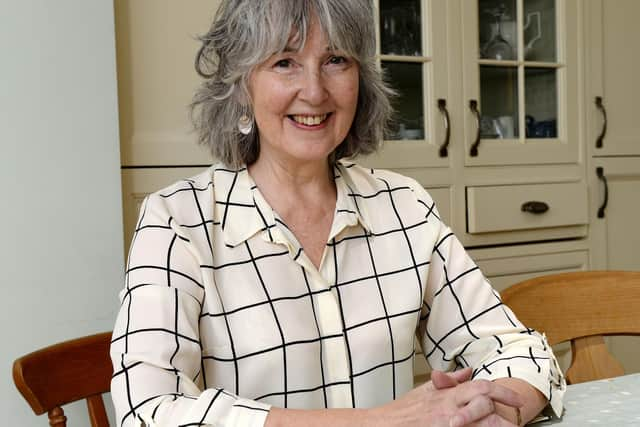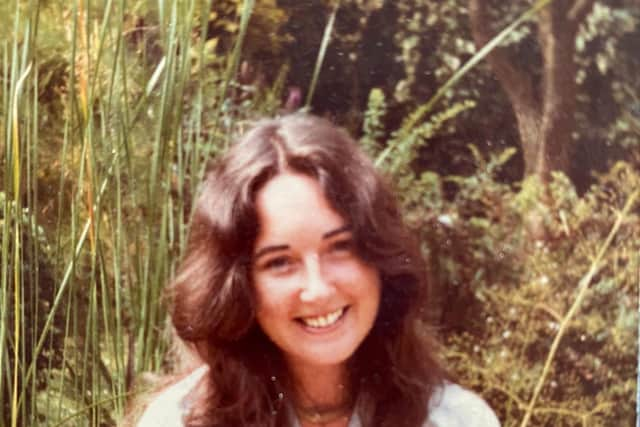Campaigners pay tribute to Sue Edgar - a brilliant communicator and powerhouse in the fight to defend Banbury's Horton hospital and the NHS


Sue died last Sunday, April 11, at home with her family after a courageous and selfless fight with cancer. Her death was announced in a report by the Banbury Guardian.
She was a founder of Banbury Health Emergency (BHE) the fore-runner to Keep the Horton General (KTHG), the Oxfordshire Socialist Health Association (OSHA) and Banbury Labour Health Matters. She was known for her outstanding ability as a communicator - someone who could sift and understand the most complicated documents in any kind of political jargon, detect the essence of the issue and give an incisive, no-frills comment.
Advertisement
Hide AdAdvertisement
Hide AdSteve Thorp, her main collaborator in BHE, described Sue as having an infallible 'bulls**t detector'.


Sue's daughter, Libby Watson, has followed her mother's example into health campaigning and writes a powerful newsletter about the inequalities of health care in the USA.
She said: "To say Mum is an inspiration to me would be vastly underselling it. Any day I do anything right, it's because it's something she would do. I'm devastated she's gone and my life will never be the same but I'm endlessly proud of everything she achieved and so honoured to have learned from her.
"I still remember her coming back from BHE meetings late at night when I was little. She'd always eat ham, tomato and a Ryvita and I think that was probably all she had for dinner - and I'd stay up late to see her get home.
Advertisement
Hide AdAdvertisement
Hide Ad"I learned my outrage at inequality and the lack of health justice, in America and at home, from her and her work for the Horton. She should've had decades more time with us but I'm still the luckiest person on Earth for being her daughter."


Sue Edgar, born Sue Watson, went to Durham University and worked in London until the 1980s when she went to live for two years in Gabon with her first husband, Andrew Edgar. Son James - now working in publishing in Oxford - and Libby were born in 1986 and 1990.
She remarried in 1998 to Dr Richard Lehman. Sue stayed at home to look after her children until their teenage and then took jobs tutoring children in English. She also ran the county's education newsletter Changing Learning. In 2011 she and Richard moved to New Haven, USA for a year, where he had a position at Yale.
In the past few years, Sue worked with the Labour Party's working group on healthcare in the area, Banbury Labour Health Matters, pushing back on government cuts to necessary health services.
Advertisement
Hide AdAdvertisement
Hide AdSteve Thorp said: "I was a Labour councillor on Cherwell District Council when we formed BHE. I was Chairman and Sue was Secretary.
"We had close links with Horton consultants Dr Peter Fisher (still a KTHG member) and Dr Harvey Marcovitch and other Labour party activists were also involved. Sue was focused on communications and she was very good at it.
"I'll always remember that incisiveness; she was really, really bright. We spent a lot of time working on the campaigns and in the lead up to the big 'March of the 5,000' in 1992, writing a paper on the domino effect - how if you remove one acute service from a district general hospital such as the Horton, others become difficult to maintain as they depend on each other.
"We realised it needed community involvement. We felt it important to get the people of Banbury involved and we knew they would react at gut level. It was an extension of the activism we were involved in. We used to have vigils at the Horton.
Advertisement
Hide AdAdvertisement
Hide Ad"We wanted to have everyone involved, but it wasn't a cross- party political thing. There had to be an acceptance of the basic principle of the National Health Service, how it was set up and that it was for everyone. It was about keeping the Horton open but - like today - there were other underpinning issues about health provision. It was very political but it wasn't meant to be isolating. We were taking a collectivist position on health provision," he said.
"Sue's legacy is that she kept plugging away for the NHS and local health care - that tenacity and insight and ability to hit the nail on the head and not taking the easy answer. She wouldn't do that, even with colleagues and friends. She was lovely as well - she was a really nice person and someone you could get on with easily."
Steve Kilsby, a past Labour Mayor who hosted one of the Horton marches, said: "Sue was a wonderful lady; all our lives are impoverished by her passing."
Sophie Hammond, maternity specialist for Keep theHorton General (KTHG), said: "I met Sue working on content for the Horton campaign and her input really made me raise my game - in fact, I was slightly in awe of her knowledge and brilliantly analytical mind. She was so insightful and generous with her time, editing my work and making helpful suggestions.
Advertisement
Hide AdAdvertisement
Hide Ad"I’m so sorry for the grief her family and many friends must feel at this time. And the wider community has lost a brilliantly sharp, dedicated and principled health campaigner. She was an example to us all."
Charlotte Bird, press officer for KTHG, said: "She was intelligent, articulate, entertaining, funny, humble, knowledgable and modest with it and one felt that no single politician who holds our life (and public services) in their hands could compare. She would have been a brilliant national politician at a time when we desperately need someone with that ability and star quality."
Dr Peter Fisher said: "Sue's most important contribution was drive and enthusiasm. The memory of this helped to inspire the setting up of KTHG to fight the next of the seemingly never ending threats to the Horton and the people it serves."
Prof Louise Wallace, CEO of the Horton until its merger with the JR in 1998, said: "Sue was a driving force in the many years of BHE and the KTHG campaign; not in the limelight but in the throwing of light on key issues and in holding decision-makers to account. As Chief Executive of the The Horton General NHS Trust I witnessed first hand her insightful and determined campaigning."
Advertisement
Hide AdAdvertisement
Hide AdSir Tony Baldry, former MP and High Steward of Banbury said: "Sue Edgar did an enormous amount of work on the campaign to ‘Keep the Horton General ‘. Reliable, full of common sense and always committed to being accurate and well briefed. Sue was someone who made a huge contribution to the community in which she lived."
Mary Evans Young, former Chair of Banbury and Bicester Labour Party said, "I feel privileged to have known Sue as a friend and comrade and didn't she make fabulous ice cream.
"Her resilience during her long battle with illness was extraordinary - she wasn't giving up that easily, she retained that wry sense of humour. Right up to the end she continued the fight to challenge government plans to re-configure the NHS and hive off services to the private sector and despite everything, selflessly concerned herself with the well-being of friends and loved ones. An absolutely amazing woman."
Cllr Dr Hosnieh Djafari-Marbini, Oxford doctor and NHS campaigner, said: "We stand on the shoulders of giants. The processes that dictate the policy direction of even our most beloved public institutions are hugely opaque.
Advertisement
Hide AdAdvertisement
Hide Ad"This can be dizzying for those of us campaigning for a better, fairer NHS and healthcare delivered by the public and for the public. Sue had the ability to make the opaque clear; all done with a wry smile and a humour rooted in an instinctive understanding of the human condition. Her clear-sighted strategic guidance delivered with razor sharp wit was a breath of fresh air for those of us relatively new to the incessant battles.
"Sue connected the micro battles against privatisation to the macro politics of the free market. She taught us, the new generation of campaigners, to connect the dots with empathy, never forgetting the patient at the heart of it; all whilst wearing the most stylish jackets. She will be greatly missed by us all."
Liz Peretz, Secretary, Oxfordshire SHA, long term member of Oxfordshire Keep Our NHS Public and retired Oxfordshire NHS and LA Manager, said: "Sue Edgar, one of the founders of Oxfordshire Socialist Health Association, who reasoned for our public health system and campaigned against the privatisation of the NHS for decades, was one of a kind.
"She is already sorely missed - our mission to protect our services needs as many hands as it can get at the moment. She will be remembered as an inspiration to those of us who continue to calmly make the case for public ownership of our publicly run and delivered UK state health service.
Advertisement
Hide AdAdvertisement
Hide Ad"To the last Sue was reasoning that successive governments' assertions that the NHS was ‘safe in their hands’ was nonsense - and she was putting the case forward articulately, in a way that journalists and politicians could not dismiss, as they would like, as 'crazy left wildness’.
"Sue showed that calm, well thought-out planning and clear public communication can make a huge difference. While the edge of steely determination came through, she was strategic with a long view for the public good; she worked cheerfully in a collective, helping to keep us engaged in the effort to expose peddled half truths - from 'community care' to 'efficiency savings' - in a long effort to keep our NHS truly public, not privatised behind the scenes."
Sue was diagnosed with lung cancer in 2018 but responded very well to immunotherapy for two years and lived an almost normal life until the middle of last year. She became more ill over the past nine months or so. She died at home, peacefully with her family, after a brief stay at Katharine House Hospice. Her last days were filled with reminiscing, laughter and her favourite home made ice cream.
If anyone would like to make a donation to Katharine House Hospice in Sue's memory please go to https://www.khh.org.uk/donate-in-memory